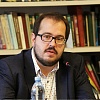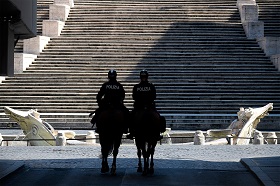In his recent article for RIAC “African American Unrest and Raising Income Tax in Russia,” Andrey Kortunov raised a very important question about the pursuit of justice being a key element of modern political life. And this element manifests itself in different countries and regions in different, yet invariably stark forms.
I think that the ideas in the article deserve close consideration, both as a matter of practical application (and Kortunov largely discusses their practical aspects) and as a matter of methodology.
Kortunov notes that “striving for justice is an organic part of human nature; it is the most powerful catalyst of any social and political activity.” This is certainly true. And his notion that justice means primarily commensurability appears to be true as well.
In the 1990s–2000s, we pondered how to be free, but we hardly ever thought about what freedom actually means. The global community had achieved a certain political consensus on the matter, stating that maximizing freedom and security would almost automatically lead us to a triumph of justice. Today, however, this consensus has been breached and will likely be replaced with a consensus on justice. Everyone will think about means of attaining justice and development as if they know what either word means, as if they believe justice will make us free. The dangers that lie in wait for us down that road stem not only from the possible resurgence of authoritarian governance in the name of economic breakthroughs, but also from the likely rejection of absolute values in the name of “selfhood” and preserving indigenous traditions. The categories we have grown used todeveloped and developing, free and less freewill become less relevant. Consequently, in the practical sense, the ideas of exporting freedom or imposing political conditions for aid programmes will become irrelevant. Even the expediency of these programmes as such could be questioned.
Finally, a shift of the global development paradigm should apparently mean a global shift in elites. Everyone and their brother was writing about societies being tired of the old elites, citing numerous examples from Donald Trump in the United States to Kais Saied in Tunisia. However, these left- and right-wing populists, new leaders coming to power and decisively setting themselves in opposition to the traditional establishment, are just the first glimpses of the future. It is reminiscent of the populist parties that won the first elections during a democratic transition. This phenomenon has been observed in many states, from Algeria and its Islamic Salvation Front to Russia and its Liberal Democratic Party. The old elites must then either adapt to the new conditions and renew themselves from within, or suffer total defeat following a desperate struggle against the new elites that are only emerging.
These are just large brush strokes outlining a new reality. Clearly, the emergence of this new reality will be accompanied by many storms and conflicts at the public, domestic and international political levels. More importantly, however, it will be fraught with value-centred and intellectual conflicts. Andrey Kortunov’s article, as well as “A Letter on Justice and Open Debate” and many other texts published today; the debates about colonial past and racism in the US, Europe, and the Middle East; and the discussions of proper court justice in Russiathese are just the first signs of the storm brewing on the horizon.
In his recent article for RIAC “African American Unrest and Raising Income Tax in Russia,” Andrey Kortunov raised a very important question about the pursuit of justice being a key element of modern political life. And this element manifests itself in different countries and regions in different, yet invariably stark forms.
I think that the ideas in the article deserve close consideration, both as a matter of practical application (and Mr. Kortunov largely discusses their practical aspects) and as a matter of methodology.
Andrey Kortunov notes that "striving for justice is an organic part of human nature; it is the most powerful catalyst of any social and political activity." This is certainly true. And his notion that justice means commensurability primarily appears to be true as well.
However, these ideas need to be taken further.
From Freedom to Justice
The idea of justice is not only important for humankind. Essentially, it could serve as a lens for viewing the entire historical process. Marxism, for instance, advances this particular understanding of history.
The same historical process, however, can be viewed through the lens of liberation, as Hegel did.
Of course, the 150 leading intellectuals who signed “A Letter on Justice and Open Debate” that was published recently in Harper’s Magazine are right when they say that freedom and justice cannot exist without each other. Nevertheless, we can say that these two determinants have been alternating in the public mind during the modern era, making it possible to assign metaphysical meaning to both the past (thereby creating the historical process construct) and the present. That, in turn, made it possible to discover meaning in a topical political reality.
Clearly, both freedom and justice were interpreted entirely differently in different places and times. However, this only served to imbue these two concepts with the flexibility of universal ideas.
It is, thus, symptomatic that, as we look at modern politics, we discover the motif of fighting for justice and view it as our preferred interpretation of reality. Ultimately, this very reality is being created through such interpretations, which are an integral of it.
When the issue is posited in that particular manner, the question of whether the proposed interpretation is adequate is redundant, unlike the question of whether it agrees with other interpretations. In other words, the crux of the matter is not whether we are right to say that the demand for justice is becoming the leitmotif of global politics, but whether other analysts agree with this understanding of reality. If they turn to the idea of justice and are in different circumstances and guided by a radically different methodology, then even if the representations coincide on the outside, on the inside, they may radically differ. As a result, we arrive at a peculiar homonymy of meaning.
For instance, Mr. Kortunov, guided by his own professional and personal experience, claims that "the problem that many people would like to view exclusively through the lens of racial relations is, in fact, a social problem." This desire to perceive racial, ethnic, denominational, gender and other problems as a certain screen concealing the true social, or, more precisely, socioeconomic reality, is quite natural for a Russian researcher. In the final analysis, the Russian intellectual elite (and political, it appears, too), due to the specifics of its own experience and education, is used to viewing the issues of identity as being to some degree secondary to the underlying economic problems.
The inconvenient truth, however, is that such a reductionist scheme no longer works.
The world has become complicated.
And in this complicated world, the issues of minority rights and gender, denominational and ethnic equality (including LGBT, a topic which inevitably still elicits juvenile grin in Russia) are no less relevant than the issues of poverty and wealth. This, in turn, means that resolving the problem of justice requires, first of all, that the interests of a far larger number of groups than before be taken into account, which makes it more difficult. Second, it requires that the political approach should be changed radically by abandoning reductionism.
Consequently, when we ponder the domestic situation in Russia, we should realize both that increasing the income tax rate on super profits is not enough and that the approach taken means adherence to simple solutions. Raising taxes is not enough. Improving the quality of life is not enough. Achieving a breakthrough is not enough.
We need to think of how to accommodate everyone’s wants and needs.
From Security to Development
Still, the growing demand for justice becomes a challenge not only for individual politicians, but also for global politics as a whole.
This could mean a fundamental change in its key determinants.
If we look at international relations through the lens of freedom/justice, we can see that each part of the dichotomy took some very specific forms therein.
After 1991, freedom was the key concept. Ultimately, it was the inspiration for all the key political thinkers of the last few decades, including Francis Fukuyama, Fareed Zakaria, Samuel Huntington, Joseph Nye, etc. Previously, this concept dominated during world wars: Woodrow Wilson, national liberation movements in Asia and Africa, Ortega y Gasset, Georges Sorel, Erich Fromm, Karl Popper, etc.
In the late 20th and early 21st centuries, the concept of freedom in politics primarily took the form of the ideas of democratization and protection of human rights. However, the concept of freedom also produced the securitization of the global politics that had been evident throughout those years. This process manifested itself in the endless struggle against international terrorism, which turned out to be a sort of a chorus in international relations during the last two decades.
The entire global community, at least in its rhetoric, demonstrated its readiness to unite against this common enemy.
The paradox was that the more anonymous that common enemy was, the starker the readiness was to unite. Al-Qaeda led by the elusive Osama Ben Laden, or ISIL led by the self-proclaimed “Caliph” al-Baghdadi, could still serve as causes for concerted action. Especially since the leaders of both organizations were gradually becoming more and more mythologized, eternally avoiding the implacable Nemesis in the endless expanses of the deserts, in lands that seemed to exist beyond the boundaries of a rationally comprehensible world. At the same time, the moment some actors attempted to make the image of the enemy more specific by linking it to a particular state, it invariably produced a split in the global community.
In the mid-2010s, ISIL offered an ideal standard of absolute evil that is both specific, i.e., located within a certain territory and loudly asserting itself in the information space, and also abstract, apparently unconnected to any traditional actor and standing in self-imposed opposition to the rational and structured world.
Soon after ISIL was defeated, the concept of securitization started to exhaust itself. Although almost all experts believe that the radical jihadi ideology has not disappeared and may well resurface, the ideology itself is clearly not enough to unite the global community.
The pandemic, which has become a catalyst for many socio-political processes that had been brewing, is pushing securitization even further into the past. In that respect, the importance of COVID-19 for global politics is quite comparable to 1991 or the tragedy of 9/11.
Certainly, we can agree with those researchers who believe that, in and of itself, the pandemic has not affected the balance of power in international relations. It has not resulted in old conflicts disappearing or new conflicts emerging, nor has it united the global community in a fight against the common threat. Nevertheless, having seriously affected the socioeconomic sphere in many countries (and the most developed ones at that), the virus has exacerbated their social conflicts and sped up the transition to that very demand for justice that Mr. Kortunov wrote about.
The consequences are contradictory. At first glance, it may certainly mean further securitization; the umbrella security concept extending to a growing number of new areas, such as social policy and healthcare; and countries boosting their standing on the international stage. In domestic politics, it could mean strengthening the security functions of the state and the relevant institutions. It appears, however, that such scenarios may be realized in the short term. They do not entail solutions to the underlying problems of modern society connected to justice and development.
Just like securitization is the flip side of the struggle for freedom, developmentalization is the middle name of the desire for justice. The demand for justice is ultimately a demand for all types of development: economic, social, value-based, etc.
There are a number of consequences to this. First of all, the well-known concept of strengthening national states needs to be adjusted. States will only grow stronger where and to the extent that they are able to resolve their development problems. If they are unable to resolve these problems, then grassroots public bodies will take on the task of providing solutions. In some cases, it might be civil society institutions. But far more frequently, it will be the self-organization bodies of those who had previously attempted to assume social responsibility, including unofficial potestary groups, organized crime groups, tribal bodies, religious and political movements, etc. In some regions, including the Middle East, this will pose a challenge to those political regimes that rest solely on the discourse of security and tradition, while endless talk of impending changes and the dangers of rocking the boat is substituted for real development.
At the same time, transitioning from the imperative of freedom to the imperative of justice should mean that both concepts should be problematized again. In the 1990s–2000s, we pondered how to be free, but we hardly ever thought about what freedom actually means. The global community had achieved a certain political consensus on the matter, stating that maximizing freedom and security would almost automatically lead us to a triumph of justice. Today, however, this consensus has been breached and will likely be replaced with a consensus on justice. Everyone will think about means of attaining justice and development as if they know what either word means, as if they believe justice will make us free. The dangers that lie in wait for us down that road stem not only from the possible resurgence of authoritarian governance in the name of economic breakthroughs, but also from the likely rejection of absolute values in the name of “selfhood” and preserving indigenous traditions. The categories we have grown used to — developed and developing, free and less freewill become less relevant. Consequently, in the practical sense, the ideas of exporting freedom or imposing political conditions for aid programmes will become irrelevant. Even the expediency of these programmes as such could be questioned.
Finally, a shift of the global development paradigm should apparently mean a global shift in elites. Everyone and their brother was writing about societies being tired of the old elites, citing numerous examples from Donald Trump in the United States to Kais Saied in Tunisia. However, these left- and right-wing populists, new leaders coming to power and decisively setting themselves in opposition to the traditional establishment, are just the first glimpses of the future. It is reminiscent of the populist parties that won the first elections during a democratic transition. This phenomenon has been observed in many states, from Algeria and its Islamic Salvation Front to Russia and its Liberal Democratic Party. The old elites must then either adapt to the new conditions and renew themselves from within, or suffer total defeat following a desperate struggle against the new elites that are only emerging.
These are just large brush strokes outlining a new reality. Clearly, the emergence of this new reality will be accompanied by many storms and conflicts at the public, domestic and international political levels. More importantly, however, it will be fraught with value-centred and intellectual conflicts. Andrey Kortunov’s article, “A Letter on Justice and Open Debate,” and many other texts that appear these days; the debates about the colonial past and racism in the United States, Europe and the Middle East; discussions of proper court justice in Russiathese are just the first signs of the storm brewing on the horizon.







